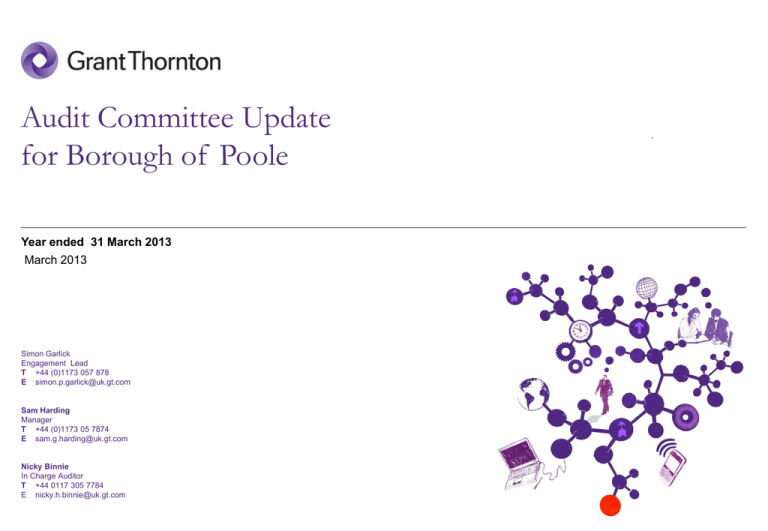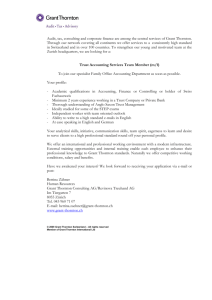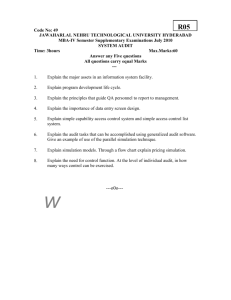
Audit Committee Update
for Borough of Poole
Year ended 31 March 2013
March 2013
Simon Garlick
Engagement Lead
T +44 (0)1173 057 878
E simon.p.garlick@uk.gt.com
Sam Harding
Manager
T +44 (0)1173 05 7874
E sam.g.harding@uk.gt.com
Nicky Binnie
In Charge Auditor
T +44 0117 305 7784
E nicky.h.binnie@uk.gt.com
© 2013 Grant Thornton UK LLP | Report Name | Date
.
The contents of this report relate only to the matters which have come to our attention,
which we believe need to be reported to you as part of our audit process. It is not a
comprehensive record of all the relevant matters, which may be subject to change, and in
particular we cannot be held responsible to you for reporting all of the risks which may affect
your business or any weaknesses in your internal controls. This report has been prepared
solely for your benefit and should not be quoted in whole or in part without our prior written
consent. We do not accept any responsibility for any loss occasioned to any third party acting,
or refraining from acting on the basis of the content of this report, as this report was not
prepared for, nor intended for, any other purpose.
.
Contents
Section
Page
Introduction
4
Progress at 15 March 2013
5
Emerging issues and developments
Accounting and audit issues
7
Grant Thornton
10
Local government guidance
11
© 2013 Grant Thornton UK LLP | Report Name | Date
3
Introduction
This paper provides the Audit Committee with a report on progress in delivering our responsibilities as your external auditors. The paper also
includes:
• a summary of emerging national issues and developments that may be relevant to you as a those charged with governance.
• includes a number of challenge questions in respect of these emerging issues which the Committee may wish to consider.
Members of the Audit Committee can find further useful material on our website www.grant-thornton.co.uk, where we have a section dedicated
to our work in the public sector. Here you can download copies of our publications - 'Local Government Governance Review 2012', 'The
developing internal audit agenda', 'Preparing for the future', 'Surviving the storm: how resilient are local authorities?'
If you would like further information on any items in this briefing, or would like to register with Grant Thornton to receive regular email updates
on issues that are of interest to you, please contact either your Engagement Lead or Manager.
Simon Garlick Engagement Lead T 0117 305 7878 M 07880456129
simon.p.garlick@uk.gt.com
Sam Harding Manager T 0117 305 7874 M 07880456131
sam.g.harding@uk.gt.com
© 2013 Grant Thornton UK LLP | Report Name | Date
4
Progress at 15 March 2013
Work
Planned date
Complete? Comments
2012-13 Accounts Audit Plan
We are required to issue a detailed accounts audit
plan to the Authority setting out our proposed
approach in order to give an opinion on the Authority's
2012-13 financial statements.
April 2013
Yes
We are have undertaken a review of key risks that
the Authority faces. These risks need to be
considered as they may have an impact on the Audit
Plan and our audit response. Our planning process
has been completed and we have incorporated key
messages that arise as a result of our regular
meetings with Internal Audit, the Chief Financial
Officer and members of the Finance team. Our Audit
Plan has been discussed with the Chief Financial
Officer and is presented at the April Audit
Committee.
Interim accounts audit Our interim fieldwork visit will
include the following:
• updated review of the control environment
• update understanding of financial systems
• review of Internal Audit reports
• early work on emerging accounting issues
• early substantive testing
• proposed Value for Money initial assessment.
January to March
Yes
We have completed our interim audit fieldwork. The
findings from this review will inform the approach
that we will take to testing at the final accounts stage
of our audit. The findings are presented in our Audit
Plan.
2012-13 final accounts audit
Including:
July
Yes
Due to commence in early July once the draft
financial statements have been provided to audit.
• audit of the 2012-13 financial statements
• proposed opinion on the Authority 's accounts
• proposed Value for Money conclusion.
© 2013 Grant Thornton UK LLP | Report Name | Date
5
Progress at 15 March 2013
Work
Value for Money (VfM) conclusion
The scope of our work to inform the 2012/13 VFM
conclusion comprises:
Planned date
© 2013 Grant Thornton UK LLP | Report Name | Date
Comments
March to
September 2013
Our initial risk assessment has been completed. This
risk assessment will be continually reviewed
throughout the course of the audit. All of our work will
be used to inform the value for money conclusion for
2012/13.
June –
November 2013
We will audit those grants that require audit
certification in accordance with Audit Commission
guidance and department deadlines.
• a detailed review of financial resilience;
• challenging how the Authority secures value for
money in it's operations
Grant Certification Work 2012/13.
Complete?
6
Emerging issues and developments
Accounting and audit issues
Implications of the Local Government Finance Act 2012
The Local Government Finance Act 2012 has now been given Royal Assent. The Act has amendments in two areas of local government
finance:
• Council tax support will now be localised and local authorities will be responsible for implementing their own council tax reduction
schemes.
• 50% of the non domestic rates collected locally will be retained by the local authority. Billing authorities will pay over a share to central
government and proportionate shares to their precepting bodies.
In December 2012, CIPFA issued a consultation on proposed amendments to the 2013/14 Code of Practice on Local Authority Accounting
in the United Kingdom for the implications of business rates retention schemes. In summary, the changes are to account for business
rates in a similar way to council tax. The Comprehensive Income and Expenditure Statement will need to show amounts collectible by
each authority. Debtors/creditors will be recognised when these amounts do not match the actual amounts paid by each billing authority
over to preceptors and government. The Collection Fund adjustment account will be used for accounting for the differences. Top-ups and
tariffs and the safety net and levy will be recognised as grant income or expenditure. Individual authorities in a pool will need to account
for their share of income and expenditure debtors/creditors as stipulated in any agreement made by individual authorities in the pool.
Challenge questions:
• Do you know your key risks?
• Have officers ensured the financial impact is fed into medium term financial plans?
• Have officers undertaken modelling of future business rates growth?
• Have officers given due consideration to pooling?
• Have officers considered the possible impact on council tax collection rates if they do reduce benefit entitlement in line with the funding
reduction?
• Has your Chief Financial Officer reviewed the proposed amendments to the 2013/14 Code and assessed the potential impact?
© 2013 Grant Thornton UK LLP | Report Name | Date
7
Emerging issues and developments
Accounting and audit issues
CIPFA consultation on Service Reporting Code of Practice 2014/15: Adult Social Care Service Expenditure Analysis (England
only)
In January, CIPFA issued a consultation on the proposed changes to the Adult Social Care Service Expenditure Analysis. The proposed
changes are for a complete revision to the mandatory lines and these have been based on work done by the Health and Social Care
Information Centre.
The closing date for responses is 28 February 2013.
Challenge questions:
• Has your Chief Financial Officer reviewed the proposed amendments and assessed the potential impact?
• Has your Authority considered whether it wishes to respond to the consultation?
Accounting for joint arrangements
IAS 31 classified joint ventures into jointly controlled operations, jointly controlled assets and jointly controlled entities. Under IFRS 11 both
jointly controlled operations and jointly controlled assets are classified as joint operations.
Under IAS 31 members of jointly controlled entities were permitted to use proportionate consolidation or equity accounting to account for
their interests in the jointly controlled entity's assets, liabilities, revenue and expenses. Under IFRS 11 the ability to use proportional
consolidation for interests in joint ventures is no longer permitted. Equity accounting is required.
Last year, Grant Thornton published a flyer 'Accounting for joint arrangements by local authorities under IFRS 11' to highlight the changes
being introduced by IFRS 11 'Joint arrangements' compared to IAS 31 'Interests in joint ventures' for 2013/14.
Challenge question:
• Have officers considered the impact of these new arrangements?
• Are you clear on the issues arising for the Authority?
© 2013 Grant Thornton UK LLP | Report Name | Date
8
Emerging issues and developments
Accounting and audit issues
Assets transferring to academy schools
There is ongoing debate as to whether assets relating to schools that have been granted academy status should be:
• impaired to nil at the date of the granting of a transfer order on the basis that the assets will be disposed of for nil value or
• not impaired as the assets are still being used and so should be shown at the balance sheet date at full existing use value.
Our view is that this is a matter for judgement and the financial statements should set out clearly:
• the policy followed by the authority
• details of material assets that are to be transferred out of local authority control.
Where an academy school's assets are subject to a PFI arrangement, the authority may have a potential onerous contract where there is
a shortfall in funding ie. where an authority has a PFI contractual agreement to pay out more than it expects to receive back in PFI credits
and reimbursement from an academy. If an authority is facing a shortfall between its contractual obligations and the amounts it expects to
receive to fund these obligations, the authority should consider whether the contract is onerous. In considering whether or not there is an
onerous contract, the authority would need to consider the service it receives.
Challenge questions:
• Has your Chief Financial Officer considered how to account for assets relating to schools that have been granted academy status?
• Has your Chief Financial Officer considered whether or not there is an onerous contract for PFI contracts relating to academy schools?
• Has your Chief Financial Officer discussed these issues with external audit?
© 2013 Grant Thornton UK LLP | Report Name | Date
9
Emerging issues and developments
Grant Thornton
'Towards a tipping point?: Summary findings from our second year of financial health checks of English local authorities '
In December 2012, Grant Thornton published 'Towards a tipping point?: Summary findings from our second year of financial health
checks of English local authorities'. This financial health review considers key indicators of financial performance, financial governance,
strategic financial planning and financial controls to provide a summary update on how the sector is coping with the service and financial
challenges faced. The report provides a summary of the key issues, trends and good practice emerging from the review.
Challenge questions:
• Have you considered the findings of the report?
• Are there any issues that relate to your authority and what action are you going to take?
.
© 2013 Grant Thornton UK LLP | Report Name | Date
10
Emerging issues and developments
Local government guidance
'Auditing the Accounts 2011/12' report
In December, the Audit Commission published 'Auditing the Accounts 2011/12'. The report summarises the results of auditors' work on the
financial statements of both principal and small bodies. The key finding in the report is that bodies have improved the quality and
timeliness of their financial reporting in 2011/12.
Challenge questions:
• Has your Chief Financial Officer identified the key risks for the authority in preparing the 2012/13 financial statements?
• Has your Chief Financial Officer produced a robust and adequately resourced timetable for the production and submission of its
2012/13 financial statements?
'Striking a balance: improving councils' decision making on reserves'
In December, the Audit Commission published 'Striking a balance: improving council's decision making on reserves'. The report covers
the findings from research undertaken by the Audit Commission on the level of reserves that councils hold and the decisions councils
make on them.
The report encourages English councils to focus more attention on their reserves. It suggests that management should be providing more
comprehensive information on reserves to elected members and councils should provide greater clarity on the reasons for holding
reserves. The report includes questions for elected members that will help them in their decision making and scrutiny roles.
Challenge questions:
• Are your officers providing you with the right information about reserves?
• Have you considered the findings of the report and identified where actions are required?
© 2013 Grant Thornton UK LLP | Report Name | Date
11
Emerging issues and developments
Local government guidance
'Tough Times: Councils' financial health in challenging times'
In November, the Audit Commission published 'Tough times 2012: Council's financial health in challenging times': This is the second
report it has produced looking at how councils are dealing with the issues from the Spending Review and focuses on the financial health
of councils.
The report finds that councils generally delivered on their planned savings, however, auditors reported that signs of financial stress were
visible.
T
Challenge question:
• Have you considered the findings of the report and any actions required?
'Protecting the public purse 2012'
In November, the Audit Commission published 'Protecting the public purse 2012: Fighting fraud against local government'. The report
provides the results of the Audit Commission's annual survey of English local government bodies. It finds that local government bodies are
targeting their investigative resources more efficiently and effectively. Local government bodies detected more than 124,000 cases of
fraud in 2011/12 totalling £179m. It also reports that new frauds are emerging in areas such as business rates, Right to Buy housing
discounts and schools.
The report includes a checklist for those charged with governance to use to review their counter-fraud arrangements.
Challenge questions:
• Have you considered the findings of the report?
• Are there any issues that could relate to your authority and how are these being dealt with?
• Have you reviewed your existing arrangements for tackling fraud?
If you have any fraud queries, talk to your audit manager to see how Grant Thornton could help.
© 2013 Grant Thornton UK LLP | Report Name | Date
12
Emerging issues and developments
Local government guidance
Broadband Initiative – Rural Broadband Fund
The Government has committed to delivering superfast broadband (24Mbps) accessibility to 90% of UK premises, and a minimum of 2
mbps to the remaining 10% of premises. The Department of Culture Media and Sport (DCMS) has entered into a Framework Agreement
with two Suppliers, BT and Fujitsu, for the purposes of delivering this broadband infrastructure.
Local authorities are responsible for utilising the Framework Agreement to procure superfast broadband infrastructure for their areas.
DCMS has grouped local authorities in England into circa 40 regions which are undertaking call-off procurements with BT and Fujitsu on a
phased basis. Local authorities are therefore at different stages of the process (i.e. pre-procurement, in procurement, or at the award
stage). The first local authorities to undertake the call-off process have recently awarded contracts to BT.
There are a number of important financial and commercial issues which local authorities will need to understand, investigate and
take action in order to secure and demonstrate value for money. The main issues are:
• Procurement strategy
• Grant agreements
• Financial forecasts
• Milestone payments
• Phasing of roll-out
• Demonstrating value for money
Challenge questions:
• Are you happy that officers have identified the financial and commercial issues relating to the delivery of superfast broadband?
• Can officers demonstrate value for money has been achieved?
Grant Thornton has significant experience of advising the public sector on broadband procurements of this nature. Please talk to your
audit manager if you would like more information.
© 2013 Grant Thornton UK LLP | Report Name | Date
13
© 2013 Grant Thornton UK LLP. All rights reserved.
'Grant Thornton' means Grant Thornton UK LLP, a limited
liability partnership.
Grant Thornton is a member firm of Grant Thornton International Ltd
(Grant Thornton International). References to 'Grant Thornton' are
to the brand under which the Grant Thornton member firms operate
and refer to one or more member firms, as the context requires.
Grant Thornton International and the member firms are not a
worldwide partnership. Services are delivered independently by
member firms, which are not responsible for the services or activities
of one another. Grant Thornton International does not provide
services to clients.
grant-thornton.co.uk







